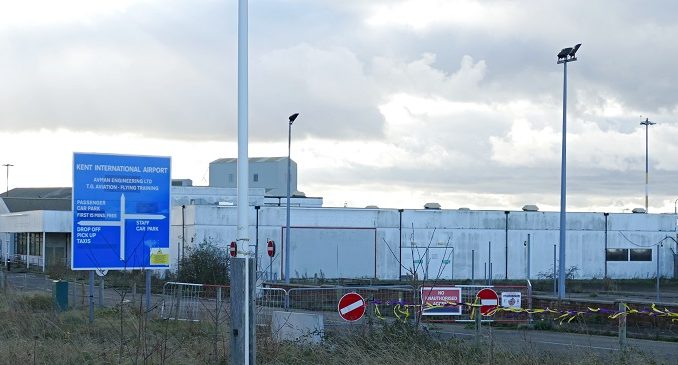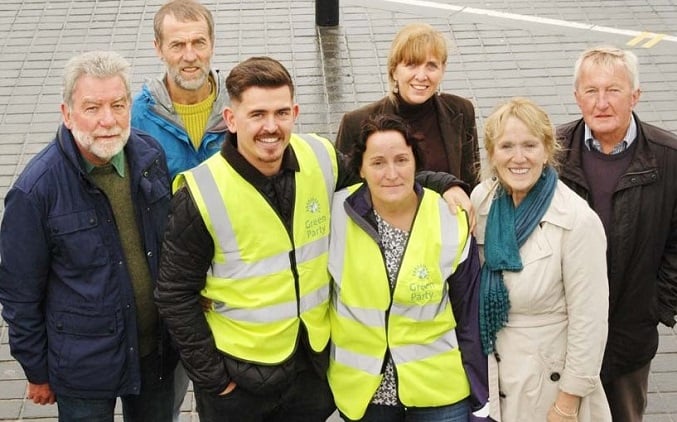
An education and training facility at the Manston airport site is planned to open in 2023, most likely on the Northern Grass, say site owners RiverOak Strategic Partners (RSP).
RSP, which was granted a Development Consent Order by the government on July 9 to proceed with plans for a freight hub and associated aviation at the site, says it wants to create a facility that will give training to young people but also offer opportunities to the long-term unemployed.
The aim is to relocate the RAF Manston History Museum and have the new facility alongside it. The museum will remain independent with its own Board of Trustees, separate entrance and admission charging policy but would be able to expand its own education programmes.
The proposal would be along the lines of Stansted Airport College – part of Harlow College – which works in partnership with the airport offering tailored aviation training programmes and apprenticeship schemes to help jobs seekers gain the necessary skills to enable them to secure employment at the airport.
Stansted Airport College is a joint venture between London Stansted and Harlow College with additional funding from the South East Local Enterprise Partnership (SELEP), Essex County Council, Uttlesford District Council and the Savoy Trust.
RSP says a similar venture will be part of the development at Manston with the aim of opening it at around the same time as the airport becomes operational.

RSP director Tony Freudmann said: “We will be offering facilities for young people in Thanet. The current plan is to create a facility on the airfield, probably at the Northern Grass.
“We have been to see Stansted College – the outreach of Harlow College – and youngsters with varying levels of qualifications train with a view to employment at the airport. There are a number of youngsters who gain their Level 2 and then go off to get trained with Ryan Air and we are keen to do that.”
RSP has been working with East Kent Group – which runs campuses including Broadstairs College – Canterbury Christ Church University and Kent County Council through its Manston Skills and Employment Board (MSE-B). Work has also taken place with Discovery Park. The plan is to offer apprenticeships, NVQs and T levels. Degree education, particularly in the field of engineering, may also be offered and discussions are taking place with CCCU on that subject.
A training facility ‘concept report’ says the plan is to buy an aircraft for students to work on with associated teaching workshops.
The report outlines expected courses as:
Aviation-specific:
Apprenticeships in relevant technical specialisms including mechanical and electrical engineering
Engineering Technician Mechatronics Maintenance Apprenticeship
Aircraft Maintenance Fitter/Technician Apprenticeship
Aviation Ground Specialist Apprenticeship
Team Leader/Supervisor Apprenticeship
Airside Operator Apprenticeship
Aviation Ground Operative Apprenticeship
Aviation Operations Manager Apprenticeship
Non-aviation courses in professions associated with the operation of an airport:
Chef de Partie Apprenticeship
Commis Chef Apprenticeship
Events Assistant Apprenticeship
Hospitality Supervisor Apprenticeship
Hospitality Team Member Apprenticeship
Hospitality Manager Apprenticeship
Senior Chef Production Cooking Apprenticeship
Hospitality and events management
Retail and Barista training
Customer service training
General Security and First Aid training
It is hoped training can also be offered to those currently unemployed in the same disciplines as those being offered to younger students but also with a focus on retraining and upskilling.
Mr Freudmann said: “We would really want to hear from former employees at Manston who would like to return, regardless of age and whether it is all week or a couple of days a week. It may be they can take part in training our students and sharing their skills.”
The concept report also says: “Engaging with and inspiring long-term unemployed or underemployed adults will be a key focus for the Manston facility. We would also focus on retraining and up-skilling adults who have previously worked at Manston and those who would like to move their career to the airport.
“This may also include those with a background in aviation who would like to train to teach. It may also be possible to offer English language courses for marine and aviation professionals from overseas.”
Training is expected to span areas including airport security, cargo handling, operations management and fire services, with the report adding: “The Manston facility would lead the way in R&D and provide the necessary training and re-training as required.”
Associated businesses with sites close to the airport would also be able to take advantage of training facilities and school visits to the museum and training site would be encouraged.
The report says: “The Manston facility could incorporate the RAF Manston History Museum, a current aircraft for use in training students, training rooms, workshops, library, VR suites, apprentice hub, library, school visit centre, community learning including support for home schooled children, conference centre and innovation hub. All these facilities would support the local community and enhance the quality of life for residents.”
How it would look:
The suggested early stage layout is:
On the ground floor, the museum would be to one side of the building. It would have its own entrance and be completely independent, with decisions about management, charging, events etc. made by the Trustees.
Separating the museum from the Academy would be the aircraft, used for Canterbury Christ Church students to dismantle and re-assemble. This would be housed in a glass atrium reaching through all levels. A high level walkway would provide viewing for visitors, particularly school parties. This could, if the museum so wished, be accessible from their facility. The atrium would also house the reception area.
On the other side of the atrium could be workshops, VR suites and the innovation centre for start up businesses.
On the next floor would be the conference facilities/performance space/lecture theatre, which could double as additional flexible classroom space by use of partitioning. The space could also host school parties.
Opposite the conference facilities would be classrooms, a library, and an apprentice hub.
A separate level or mezzanine attached to the atrium could house a restaurant for students and visitors. Positioned with views over the airfield, this would provide an attractive location to relax between classes, conduct informal business meetings or to visit and look at the airport in operation. The restaurant may also provide in-work training for hospitality students.
Suggestions for funding range from a commercial operation run by RSP or an agent; appointing a lead provider; outsourcing or creating a joint partnership between the airport and a specialist university.
RSP, which has spent some £38million to date on the DCO and buying the Jentex site, will provide the land for the training site with a possibility that investors will support it.
The report adds: “We expect to continue to work with KCC and to engage with SELEP to explore funding opportunities. Other funding sources will depend on the business model and the stakeholders involved.”
Providing training and local employment is part of the DCO terms. Under a unilateral undertaking with Thanet council RSP is obliged to make an initial payment of £250,000 and an annual payment of £50,000 over a 20 year period.
Employing locally is also a term of the DCO.
Mr Freudmann says RSP is keen to have a local workforce. He estimates that during construction, due to start next year, there will be around 600 people on site and that airport forecasts are for employment of ‘several thousand’ locally.
RSP’s next steps?
Survey and design works – for infrastructure; preparing for the huge levelling task of reducing the gradient at Manston from around 3&% to 1%; making sure the aquifer is protected; checking the strength of the runway.
Mr Freudmann said: “During the later part of the design process we will be bringing in a major contractor. They will be instructed to employ as much local labour as they can – and that is a condition of the DCO anyway.
Construction work – due to start next summer running through to the early part of 2023.
Alongside this there will be the work with the Civil Aviation Authority on the flight paths, which will look at areas including how many flights go over Ramsgate and how many go in the direction over St Nicholas-at-Wade. The flight path decision will be made by the CAA. Public consultation on the paths is expected to take place this autumn.
Aerodrome certification will also need to be issued by the CAA which means approving all the ground operations, the operating manual, airfield safety, security and more.
Cargo -Capital works taking place up until opening in the first quarter of 2023 will include the creation of a cargo shed.
Mr Freudmann said: “A lot of cargo is being shipped in and out of European airports because slots aren’t available at London airports, there is a huge shortage of capacity. For example Frankfurt has 4 runways but Heathrow has only 2.
“For Manston we are talking about 747 freighters, four or five movements a day. We are restricted by the DCO to 18,000 cargo and 7,000 passenger movements per year. Put that in contet Gatwick has around 300,000 so we will be small scale but with big aircraft carrying cargo in and out.
“There is a growing Amazon type of operation bringing stuff to customers and they need flights in the daytime, which we have got, and they need land to build facilities. Other airports do not have much land and so 10-30 acres for building on would not be available from them.
Passenger flights – Low cost flights are still in the plan but will not be for one or two years after opening due to the impact of Covid on the industry.
Mr Freudmann said: “We want to see how the design of passenger terminals will change for the post-Covid situation.”
Night flights – Mr Freudmann says the DCO prohibits night flights although a delayed arrival might happen within those restricted hours. No scheduled arrivals or departures will take place between 11pm and 6am.
Opposition and a legal challenge

The DCO approval has caused anger amongst people opposed to the creation of a cargo hub, with a crowdfunder now launched to gain funds towards a Judicial Review application.
A statement from Thanet Green Party says: “Thanet Green Party is frankly astonished at the Minister of Transport’s decision to overrule the Planning Inspectorate’s recommendations and approve the DCO for Manston.
“This decision runs counter to all the facts considered by the Examining Authority, recent Court rulings on the Government’s climate commitments and the devastating impact of Covid on the aviation sector.
“Most tellingly, the Planning Inspectorate concluded that the applicants had not provided sufficient evidence of need for a new cargo facility at Manston, even before the Covid crisis. They also cast doubt on many aspects of the applicants’ submission, including the huge numbers of jobs they predicted.
“The decision will inevitably be challenged in the courts, meaning this sorry saga will drag on well into the future, with inevitable negative effects on us in Thanet. It will also mean missed opportunities both locally and nationally to #BuildBackBetter post-Covid with sound plans for a sustainable, greener future.”
Campaigners from No Night Flights previously said: “We are incredulous that the SoS would override a recommendation from the planning inspectorate NOT to grant the DCO and will be reviewing our options to challenge this and protect our town from this horrible blight, a blight which will threaten thousands of jobs and the tourism economy as a whole.”

